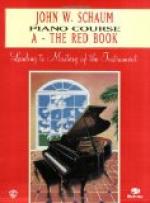“I have, as you say, a good hand for the piano; much depends on that; I have always had a good deal of what is called a natural technic. Thus when I am obliged to forego practising I do not lose my facility; an hour’s work puts the hand in condition again. What do I do to accomplish this? Different things. First some finger movements, perhaps with fingers in an extended chord position; then some scales and arpeggios; then a Chopin etude, and so on. When practising regularly, I do not generally work at the piano more than four hours a day; it seems to me that amount is sufficient, if used with absolute concentration.”
Later we adjourned to the pretty garden back of the music-room, and here we were joined by a beautiful gray Angora cat, the pet and pride of his mistress, and a very important personage indeed. He has a trick of climbing to Miss Goodson’s shoulder, from which point of vantage he surveys the world about him with all the complaisance of which an animal of such high degree is capable.
XI
MARK HAMBOURG
FORM, TECHNIC, AND EXPRESSION
[Illustration: MARK HAMBOURG]
In one of the most quiet, secluded quarters of London can be found the home of the Russian pianist, Mark Hambourg. Mr. Hambourg lives on a terrace, “far from the madding crowd,” and difficult enough of access to keep mere curiosity seekers at a distance. One can scarcely picture to one’s self, without an actual sight of them, the quaint charm of these short passages or streets, usually termed “terraces,” or “gardens.” This particular terrace looks out on a restful green park, where luxuriant trees make long shadows on the sunlit turf. The house is large and comfortable—built over a hundred years ago; its rooms are spacious, and the drawing-room and library, which lead one into the other, form a fine music salon. Surely, amid such surroundings, with priceless pictures and objets d’art all about, with exquisite colors, with space and quiet, an artist must find an ideal spot for both work and play. I expressed this thought to Mr. Hambourg when he entered; then we soon fell to discussing the necessary equipment of the teacher and pianist.
“I agree with you,” he said, “that it is the beginning of piano study which is the most difficult of all; this is where the teacher has such great responsibility and where so many teachers are so incompetent. Perhaps there are more poor teachers for the piano than for the voice. The organs of voice production cannot be seen, they can only be guessed at; so there may be a little more excuse for the vocal teacher; but for the piano we have the keys and the fingers. It should not therefore be such a very difficult thing to learn to play intelligently and correctly! Yet few seem to have got hold of the right principles or know how to impart them.”




